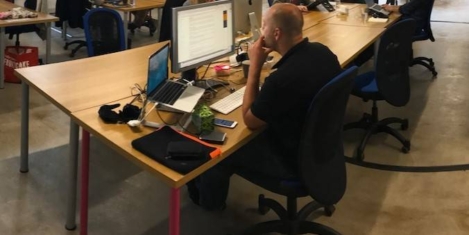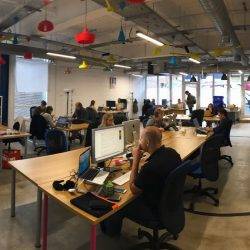January 23, 2018
Global economy faces an immediate reskilling problem in the face of automation, claims Davos report
 The global economy faces a reskilling crisis with 1.4 million jobs in the US alone vulnerable to disruption from technology and other factors by 2026, according to a new report, Towards a Reskilling Revolution: A Future of Jobs for All, published by the World Economic Forum. The report is an analysis of nearly 1,000 job types across the US economy, encompassing 96 percent of employment in the country. Its aim is to assess the scale of the reskilling task required to protect workforces from an expected wave of automation brought on by the ‘Fourth Industrial Revolution’. Drawing on this data for the US economy, the report finds that 57 percent of jobs expected to be disrupted belong to women. If called on today to move to another job with skills that match their own, 16 percent of workers would have no opportunities to transition and another 25 percent would have only between one and three matches.
The global economy faces a reskilling crisis with 1.4 million jobs in the US alone vulnerable to disruption from technology and other factors by 2026, according to a new report, Towards a Reskilling Revolution: A Future of Jobs for All, published by the World Economic Forum. The report is an analysis of nearly 1,000 job types across the US economy, encompassing 96 percent of employment in the country. Its aim is to assess the scale of the reskilling task required to protect workforces from an expected wave of automation brought on by the ‘Fourth Industrial Revolution’. Drawing on this data for the US economy, the report finds that 57 percent of jobs expected to be disrupted belong to women. If called on today to move to another job with skills that match their own, 16 percent of workers would have no opportunities to transition and another 25 percent would have only between one and three matches.



























 Two-thirds (64 percent) of employees have gone to work despite being unwell over the last 12 months, claims a new survey which found that a quarter (26 percent) of people worried that their absence will be a burden on their team. The research by Bupa shows that more than one in four (27 percent) employees ignore their doctor’s orders to stay at home and ‘soldier on’. A third of employees would go to work despite back pain or issues related to their joints and, disturbingly, a similar number (29 percent) head to work when suffering from mental health issues such as depression. As two of the most common reasons to be signed off work, Bupa’s experts fear these employees risk worsening their health, increasing the likelihood that they’ll need a prolonged period of time off work further down the line. The findings come at a time when increasing productivity is a strategic goal for most business leaders in 2018. But high levels of ‘presenteeism’ are in fact associated with loss of productivity and reduced performance – as employees who push themselves into work when unwell, risk delaying their own recovery
Two-thirds (64 percent) of employees have gone to work despite being unwell over the last 12 months, claims a new survey which found that a quarter (26 percent) of people worried that their absence will be a burden on their team. The research by Bupa shows that more than one in four (27 percent) employees ignore their doctor’s orders to stay at home and ‘soldier on’. A third of employees would go to work despite back pain or issues related to their joints and, disturbingly, a similar number (29 percent) head to work when suffering from mental health issues such as depression. As two of the most common reasons to be signed off work, Bupa’s experts fear these employees risk worsening their health, increasing the likelihood that they’ll need a prolonged period of time off work further down the line. The findings come at a time when increasing productivity is a strategic goal for most business leaders in 2018. But high levels of ‘presenteeism’ are in fact associated with loss of productivity and reduced performance – as employees who push themselves into work when unwell, risk delaying their own recovery






